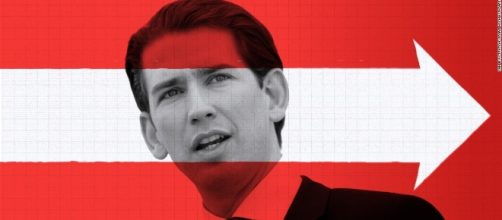Falling short of a parliamentary majority at this last Sunday's elections, Austria may be the next European country, following Germany, to face a far-right party rising in government coalitions. On paper, the odds are very simple. While securing a 32 percent victory, the People's Party, (OVP), led by a young Kurz, might be forced to create a coalition, either with the Social Democrats (SPO) or the Freedom Party (FPO).
Formed by former Nazis, the FPO is said to have left its past behind, despite regular Nazi-related scandals which forced the party to repeatedly ban party officials.
The SPO, albeit lifting a self-imposed ban on any coalitions with the FPO, shows signs of internal splitting after years of squabbling with its long-term coalition partner, OVP. Through the eyes of the far-right, this centrist coalition seems all but impossible.
Austria: Gateway for the migrant crisis into Germany
As the influx of more than 1 million people, since 2015, is now being labeled and tagged as a migrant crisis, instead of a refugee crisis. Austria's role was that of a gateway for migrants who fled into Germany. The result of this, according to Austrian voters, is having the country buoyed by right wing views.
Austria: Third place is the weak one
As the definitive result is yet to be known, due to a record number of more than 889,000 postal ballots to be counted on Monday, any outcome is still possible.
Although keeping all options on the table, Kurz's party finds itself between a rock and a hard place.
Considering the possibility of the current Chancellor Christian Kern, head of SPO, arriving third in the race, and the , achieving second, any coalition between the winning party, OVP, and FPO's leader, Heinz-Christian Strache, would make the latter new Chancellor.
Austria: has voted
Austria has voted on the reality Europe is living today. Politically, and economically, nationalism is rising, whether we like it or not. Nations are starting to ask themselves why, and what if...? Failing to connect these events with all that is going on in Europe currently is like turning a blind eye to reality.
Just as in the UK's Brexit, the German elections, and the Catalan referendum (for an independent republic), Austria has spoken through their vote.
Far right party politicals are gaining ground rightly or wrongly. Failing to see the ramifications and political repercussions within the European project might well lead to darker economic times ahead of us. Poor economic growth is usually and has been proven historically, a precursor to revolution.


